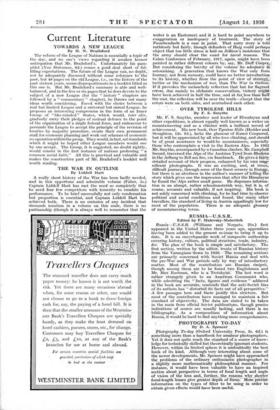TOWARDS A NEW LEAGUE
Current Literature
By H. N. Brallsford The reform of the League of Nations is essentially a topic of the day, and no one's views regarding- it awaken keener anticipation that Mr. Brailsford's. Unfortunately his pam- phlet (New Statesman, 6d.) comes a good deal short of ful- filling expectations. The future of the League can, no dokibt; not be adequately discussed, without some reference to the past, but 48 pages on the old League, i.e., on the history of the past sixteen years, seems disproportionate in a booklet titled as this one is. But Mr. Brailsford's summary is able and well- balanced, and in the five or six pages that he does devote to the subject of a new League (for the " history " chapters are followed by a " commentary " chapter), he throws out many ideas worth considering. Faced with the choice betvieen a real but limited League and a universal but unreal League, he proposes an interesting compromise in the form of an Inner Group of "like-minded" States, which would, inter alia, gradually carry their pledges of mutual defence to the point of the organisation of a single federal force, and endeavour to persuade the League to accept the principle of the revision of treaties by majority procedure, create their own permanent staff for economic planning and work out schemes of economic co-operation within the group. They would, in fact, set standards which it might be hoped other League members would one by one accept. The Group, it is suggested, no doubt rightly, would consist in the first instance of nations professing " a common social faith." All this is practical and valuable and makes the constructive part of Mr. Brailsford's booklet well worth reading.






































 Previous page
Previous page